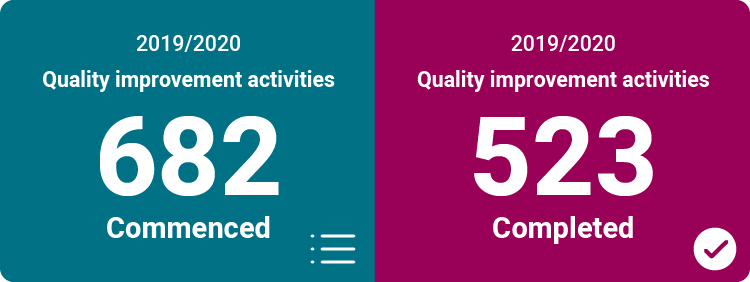Quality improvement
NMHS strives to deliver excellence in healthcare for our community. To achieve this, NMHS uses an organisation-wide quality improvement system that identifies areas for improvements and strategies to address them.
All staff across NMHS are supported to incorporate quality improvement projects and initiatives, inclusive of patient and carer involvement, as an essential aspect of continuously improving service delivery.
What is Quality Improvement?
Quality improvement activities can originate from a range of sources which may include:
- Clinical incidents
- Identified risks
- Consumer feedback
- Clinical indicators and benchmarking
- Accreditation survey results and recommendations
- Policy or program reviews and evaluations.
Examples of quality improvement activities include, but are not limited to:
- Developing a guideline or pathway
- Conducting a survey
- Trialling a new clinical assessment or process
- Developing materials for consumers
- Analysing activity and outcome data
- Improving staff safety, processes and consumer outcomes
- Creating a training package
- Re-designing a space.
GEKO
All NMHS Quality improvement activities are submitted and approved within the Governance Evidence Knowledge Outcomes (GEKO) application. This application allows for all activities to be registered, reported and monitored through the online database.
NMHS encourages staff to share lessons and learnings from quality improvement activities through a range of forums including committee meetings and reports, presentations at staff forums or conferences and scientific journals.
What improvements have we made?

Examples of two outstanding mental health quality improvement activities from 2019/20
Clozapine is a psychiatric medication that works by helping to restore the balance of certain natural chemicals (neurotransmitters) in the brain. It is used for treatment resistant schizophrenia when two other antipsychotic medications have been trialled and not been effective. Clozapine is widely accepted to be the gold standard treatment for schizophrenia, however due to potential life-threatening side effects clozapine requires strict prescribing and monitoring.
Side effects of clozapine include lowering blood cells that fight infections which may suppress the immune system, cardiovascular complications like cardiomyopathy and myocarditis, seizures, low blood pressure and severe constipation. To reduce these risks, strict monitoring of clozapine is required in Australia. Monthly blood tests and physical health monitoring is required for all patients on clozapine. All patients prescribed clozapine and their healthcare team must be registered with Clopine Central.
Engagement with local GP centres to establish GP Shared Care
Previously clozapine could only be prescribed by a Psychiatrist, this meant patients with ongoing mental health stability could not be discharged. However new changes to the PBS meant that a nominated GP can now prescribe and monitor clozapine as is done in community mental health clinics.
The aim of this quality improvement was to engage with local GP centres to promote mental and physical health allowing consumers to have their complete care by their own GP. Joondalup Community Mental Health consumers were screened and identified as being suitable to be managed by their GP thus reducing the need to attend the community mental health clinic monthly.
Discharge pathways were developed and implemented. GP appointments with the consumer and General Practice Liaison Office (GPLO) took place to provide clinical handover and education about clozapine and the monitoring requirements. This ensured the GP was proficient with the monitoring responsibilities. There is an agreed referral pathway if these consumers require readmission to the mental health service.
To date 19 Joondalup clozapine consumers have been successfully transferred to GP care.
Collaboration with clozapine consumers to improve their physical wellbeing
The Mental Health Service in partnership with other sectors and settings supports the inclusion of mental health consumers and carers in strategies and activities that aim to promote health and wellbeing.
Patients taking clozapine are at risk of poor physical health outcomes due to their mental illness and the medication they are prescribed. The Clozapine Clinic focuses on health education and health promotion.
The aim of this quality improvement was to engage with Joondalup Community Clinic consumers who were prescribed clozapine and empower them to have more control over their physical wellbeing and enable them to have an improved quality of life. A Physical Health Tool was developed to monitor these patients and combined with ongoing education sessions enabled significant results in weight loss, smoking cessation, reduction in metabolic syndrome and improved health. Between 2017 and 2020 a combined weight loss of over 70kg was achieved.
A Smokerlyzer (breath carbon monoxide monitor) was purchased in 2019 and this has been successful in some consumers in the smoking cessation individualized programme to quit smoking or greatly reduce the amount they smoke. The breath carbon monoxide monitor has been an instrumental tool in achieving these results. A total of 10 people have quit completely.

